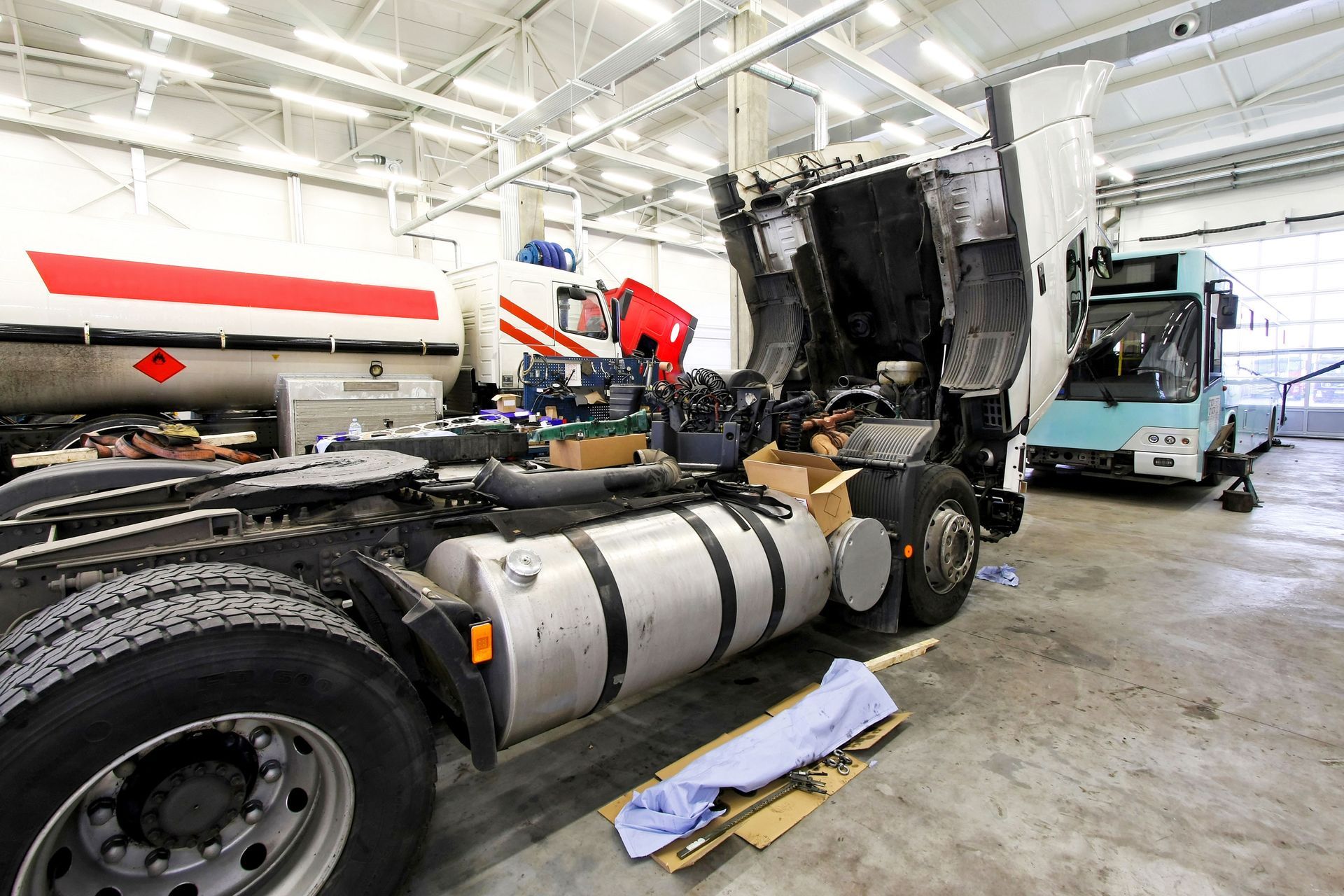September 18, 2025
Semi-truck services play a pivotal role in the global transportation industry. These services ensure the seamless movement of goods across vast distances, connecting manufacturers with markets and consumers with products. Given the heavy loads semi-trucks carry, which can go up to 80,000 lbs according to Facts.net, it is imperative that these mammoth vehicles are kept in optimal condition. The primary purpose of this article is to dive deep into the various advantages that quality semi-truck services present, ranging from reliability and cost-efficiency to environmental benefits and technological advancements. By exploring these benefits, the significance of meticulous attention to semi-truck maintenance becomes evident, ensuring efficient, safe, and sustainable transportation operations.
Reliability and Safety
Reliability and safety form the foundation of the trucking industry. Quality semi-truck services ensure minimal disruptions by focusing on reducing breakdowns. When trucks are maintained meticulously, the chances of unexpected mechanical failures decrease, ensuring that the transportation schedule remains uninterrupted. This is especially crucial when semi-trucks are responsible for transporting massive loads of up to 80,000 lbs. Such loads demand robust reliability, which can be achieved through quality services.
Driver safety is another paramount concern addressed by quality truck services. Regular maintenance procedures ensure that all safety standards are met, reducing the risk of accidents. Essential components such as brakes, tires, and lights are inspected rigorously to guarantee optimal functioning. This dedication to safety protects not only the driver but also other road users. In an industry that covers millions of miles annually, enhancing safety translates to fewer accidents and greater trust in the transportation process.
Cost Efficiency
Cost efficiency is a major driving factor in the logistics and transportation sectors. Preventive maintenance is essential in this domain as it helps in preventing expensive repairs in the future. By addressing issues in their nascent stages, companies avoid costly breakdowns that lead to interruptions in service. This proactive approach results in significant financial savings over time. With quality services ensuring that trucks operate efficiently, operational costs are significantly reduced.
Fuel efficiency stands as a critical component of cost management in trucking. Well-maintained semi-trucks ensure that fuel consumption is optimized, translating to cost savings and environmental benefits. Routine maintenance checks and calibrations ensure that trucks operate at peak efficiency, minimizing fuel wastage. Given that transporting loads of up to 80,000 lbs requires significant energy, achieving fuel efficiency is integral to cost management. These financial savings can then be redirected into other business operations, enhancing overall profitability.
The concept of cost efficiency extends to the prolonged operational lifespan of semi-trucks. Routine maintenance ensures that vehicles remain in peak condition, reducing wear and tear. This longevity means that companies don't have to replace trucks frequently, saving on capital expenditures. Additionally, well-maintained trucks boast better resale value, aiding in recapturing investments. By ensuring that trucks remain operationally efficient, companies can enjoy the financial benefits of reduced insurance premiums and enhanced vehicle valuation.
Improved Operational Efficiency
Improved operational efficiency is a significant advantage of quality truck services. Reliable trucks streamline logistics processes, ensuring that goods are delivered on time. By reducing the frequency of breakdowns, companies can maintain a seamless supply chain. In essence, efficient trucks translate to smoother logistics, offering businesses a competitive edge in the fast-paced world of transportation. This reliability ensures continuity, even when dealing with expansive loads typical of semi-trucks.
Effective time management arises from improved truck reliability. Reduced breakdown rates mean fewer unscheduled stops, allowing companies to adhere closely to delivery timetables. Enhanced scheduling eliminates the unpredictability often associated with transportation logistics, resulting in timely deliveries. This consistency in operations builds trust between companies and their clients. Consequently, businesses benefit from stronger relationships with their partners, ensuring long-term success.
The role of advanced technology in maintenance cannot be understated. Streamlined maintenance schedules, supported by predictive analytics, enhance operational efficiency. By using diagnostic tools, companies can anticipate potential issues, scheduling repairs and maintenance without disrupting operations. Additionally, integrating maintenance data with comprehensive fleet management systems further optimizes resource allocation. This level of organization ensures that businesses maximize their operational efficiency, navigating the challenges of modern logistics.
Environmental Benefits
Quality semi-truck services contribute significantly to reducing the environmental impact of transportation. Proper maintenance leads to reduced emissions, a critical factor in minimizing the ecological footprint of transportation operations. When engines operate optimally, they produce fewer pollutants, contributing to cleaner air. Furthermore, integrating eco-friendly practices such as using biodegradable oils and recyclable parts further enhances environmental responsibility. This climate-conscious approach aligns with global efforts to curb emissions and protect the environment.
Incorporating eco-friendly practices into maintenance services is increasingly common. For instance, using sustainable materials and adopting practices that minimize waste contribute to eco-friendly operations. The trucking industry has made strides in adopting such practices, ensuring that environmental benefits are realized without compromising operational efficiency. Recycling parts and fluids demonstrates a commitment to sustainable operations. These eco-conscious strategies balance operational needs with environmental stewardship, promoting a healthier planet.
Enhanced Customer Satisfaction
Customer satisfaction represents the end goal of any successful transportation operation. On-time deliveries, facilitated by reliable maintenance services, play a major role in ensuring client contentment. Customers value consistency, and when deliveries are made timely, it strengthens the trust between businesses and their clients. Meeting client expectations consistently through reliable logistics builds a robust service reputation. This reliability drives repeat business, enhancing customer relations and turning one-time engagements into lasting partnerships.
Consistent quality service bolsters a company's reputation, emphasizing its proficiency in the logistics arena. Clients appreciate the reassurance that comes with knowing their goods will arrive as scheduled without any transport glitches. The ability to guarantee quality control through regular maintenance further underscores reliability. When companies uphold stringent quality checks, they safeguard the integrity of the products they deliver. This meticulous attention to detail builds positive reputations, attracting more clients and expanding market reach.
A solid reputation extends beyond product delivery; responsive customer service also plays an integral role. Companies that prioritize immediate and informed responses to client queries foster strong relationships. Providing customer service that addresses concerns timely ensures that clients feel valued and involved. This attention to service quality generates loyalty, resulting in long-term contracts and partnerships. By building a reputation for quality service, businesses secure their position in the competitive transport sector.
Technological Advancements
Technology has transformed the landscape of semi-truck services, offering numerous advantages for modern logistics. Integration of Internet of Things (IoT) devices and telematics allows for enhanced preventive maintenance measures. Real-time data collection enables companies to monitor vehicle status, facilitating quicker responses to any anomalies. This technological edge ensures that trucks operate efficiently and any potential threats to operational efficiency are addressed promptly. As a result, businesses benefit from reduced downtime and streamlined operations.
Automated services and predictive analytics have revolutionized truck maintenance. Automation reduces human error, ensuring accurate diagnostics and repairs. Moreover, predictive analytics forecasts potential issues before they manifest, allowing proactive interventions. This technological capability enhances maintenance accuracy, ensuring that trucks remain in optimal condition. By employing modern technological solutions, companies enhance their operational readiness, adapting seamlessly to the evolving logistics landscape.
Quality semi-truck services present an array of benefits that enhance the efficiency, safety, and sustainability of transportation operations. From achieving cost savings and operational efficiency to fostering customer satisfaction and environmental stewardship, the advantages are extensive. Furthermore, the integration of technological advancements ensures that the industry remains innovative and adaptable. As businesses continue to rely on the transportation sector for global connectivity, investing in quality services ensures that semi-trucks operate seamlessly, carrying substantial loads like those up to 80,000 lbs across vast distances. By prioritizing maintenance excellence, companies position themselves for success in an increasingly competitive and environmentally conscious marketplace.






